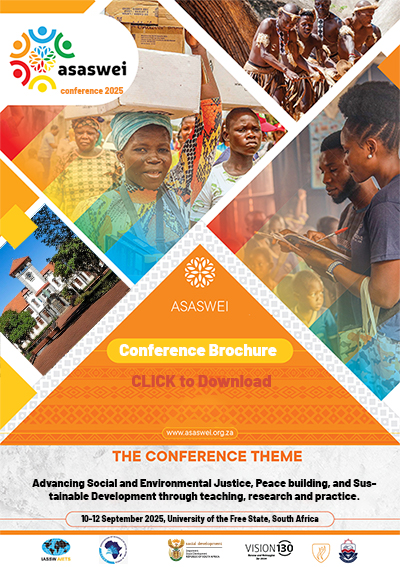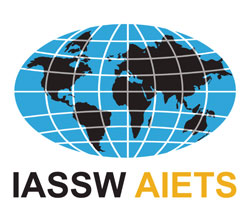
Conference Theme
Advancing Social and Environmental Justice, Peace building, and Sustainable Development through teaching, research and practice.
Call for Abstracts:
We welcome abstract submissions under the following sub themes, as well as any other related topics:
i. Green Social Work and Climate Resilience: Supporting Vulnerable Communities in the Face of Environmental Crises:
- How social work integrates environmental justice, sustainability, and ecological perspectives into practice.
- The impact of climate-related disasters (e.g., floods, wildfires, droughts) on marginalized and vulnerable populations.
- How social workers support resilience, adaptation, and recovery in affected communities.
- How social workers influence policies to address climate justice and environmental sustainability.
- Incorporating traditional practices in promoting environmental stewardship and resilience.
- The role of indigenous knowledge in environmental conservation.
- Decolonizing environmental practices and fostering cultural sustainability.
- Collaborations with Indigenous communities for ecological justice.
ii. Social Work and the Achievement of Sustainable Development Goals (SDGs): - Social work’s contribution toward global sustainability and equity goals.
- Research and practice strategies pertaining to health, mental health and wellbeing including poverty eradication, quality education, gender equality, decent work and economic growth
- Work with special and vulnerable populations (children, families, women, older persons, LGBTQIA+ etc)
- Social work supervision, management
- School Social Work and Environmental Education:
iii. Policy and Advocacy for Peace building, Environmental and Social Justice: - Influencing policies that promote environmental sustainability and social equity.
- Social workers, social movements and advocacy during wars, natural and medical disasters
- Social workers as advocates for environmental rights and sustainability.
- Influencing public policy to address environmental inequalities.
- Strategies for promoting environmental activism within the profession.
iv. Social Work Education, Transdisciplinarity and Curriculum Development: - Preparing future social workers for roles in in nontraditional social work environments
- Strategies on building responsive social work curricula
- Entrepreneurship, environmental justice and sustainable development.
- Building competencies for environmental practice in social work students.
- Innovative teaching methodologies focused on sustainability.
- Learning and teaching innovations during student protests and natural disasters
- Innovative teaching methodologies, and Innovations in postgraduate supervision
- Navigating curriculum audits
- Experiential learning and community-based research in environmental social work
v. Feminist Perspectives and Environmental Justice: - Gendered dimensions of environmental challenges and climate justice.
- Feminist approaches to green social work.
- Empowering women as leaders in environmental advocacy and sustainability.
vi. Main-streaming Digital and Assessment Tools in Social Work Practice - Integrating digital tools into traditional social work settings
- Evaluating the effectiveness of digital tools in Social Work practice
- Innovative digital interventions for diverse populations
- Digital literacy and capacity building for social workers
– Ethical Implications and challenges of digital adoption in social work
vii. International and Cross-Cultural Collaborations in Green Social Work
- Global perspectives and initiatives in environmental social work
- Partnerships between academia, NGOs, and governments for climate resilience
- South-South, South North knowledge exchange in eco-social work
- Abstract Submission Guidelines
- Word Count: Abstracts should not exceed 300 words.
- Font: Use Arial, size 12.
- Authors: Include all contributing authors’ names (First Name, Last Name) and their affiliated institutions. The corresponding author should be clearly indicated with an asterisk (*) next to their name.
- Contact Details: Provide the corresponding author’s full contact details (email address and phone number).
8.1. Abstract Structure: - The abstract should be written in a single paragraph, summarizing the main objectives, methods, results, and conclusions of the work. We welcome theoretical explorations, practice-based innovations, and empirical studies.
- The abstract must be concise and clear, reflecting the core of your presentation. Please do not include references in the abstract
- Deadline for Submission: 30 April 2025 Submission Portal: secretary@asaswei.org.za
- Note: Accepted papers will be considered for a special conference publication on ‘Advancing Social and Environmental Justice, Peace building, and Sustainable Development through teaching, research and practice’.
- More details : https://www.iassw-aiets.org/wp-content/uploads/2025/02/ASASWEI-Conference-2025-Brochure.pdf





